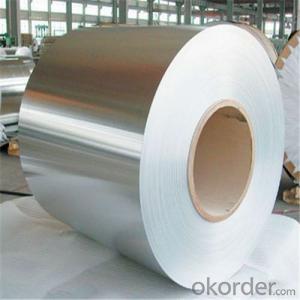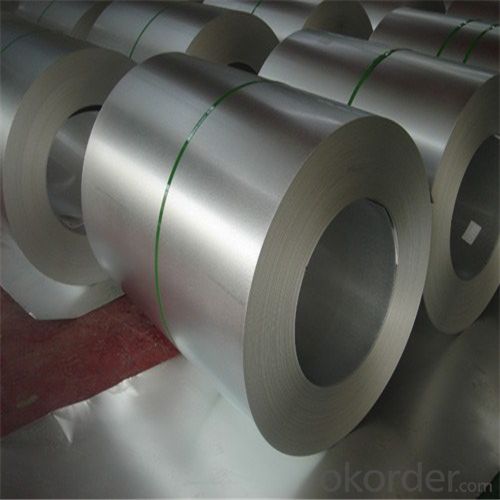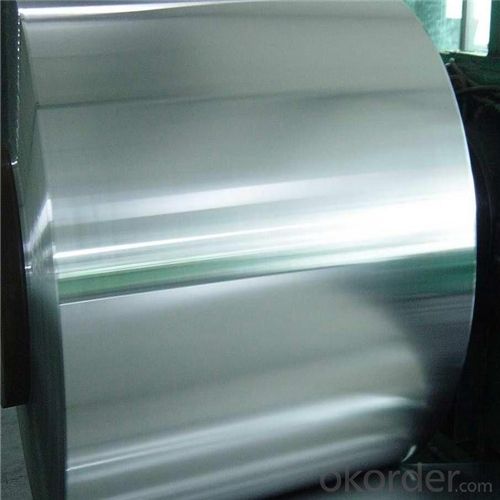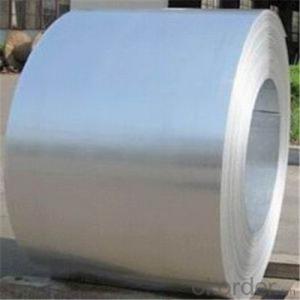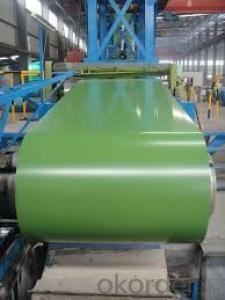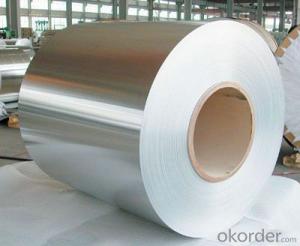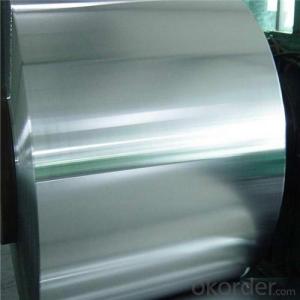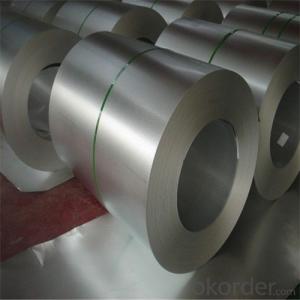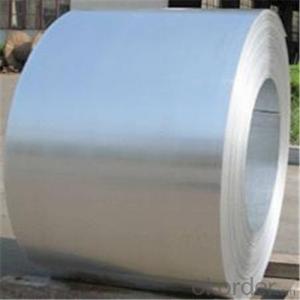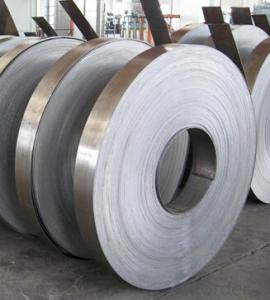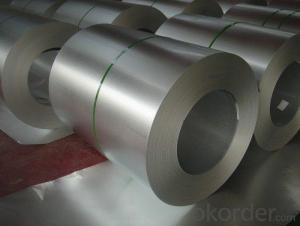Hot-Dip Aluzinc Steel Coil Used for Industry with Too High Quality
- Loading Port:
- Shanghai
- Payment Terms:
- TT or LC
- Min Order Qty:
- 25 m.t.
- Supply Capability:
- 5000 m.t./month
OKorder Service Pledge
OKorder Financial Service
You Might Also Like
Hot-Dip Aluzinc Steel Coil Used for Industry
1.Structure of Hot-Dip Aluzinc Steel Coil Description
Hot-dip aluzinc steel sheet is substrated on cold rolled steel in various strength and specification. Coating composition is 55% aluminmum in weight ratio, 43.4% zinc, and 1.5% silicon, with excellent and heat resistance performance.
2.Main Features of the Hot-Dip Aluzinc Steel Coil
•High Purity
•Easy control and operation
•High strength
•Fast melting
•Competitive price
•Best Service
3. Hot-Dip Aluzinc Steel Coil Images
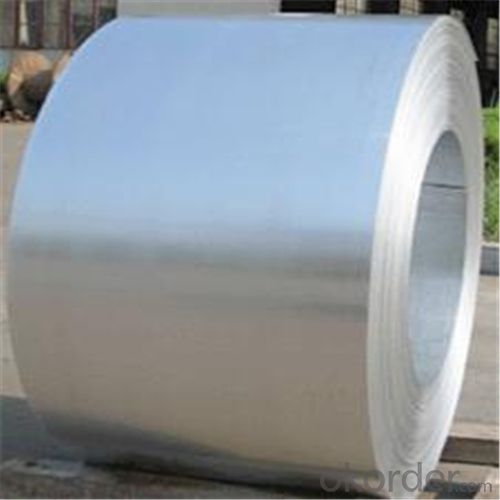
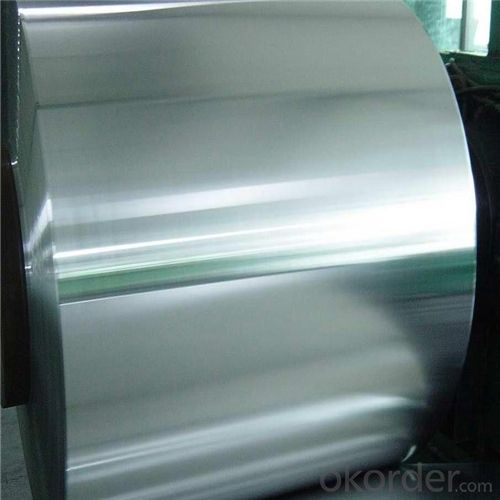
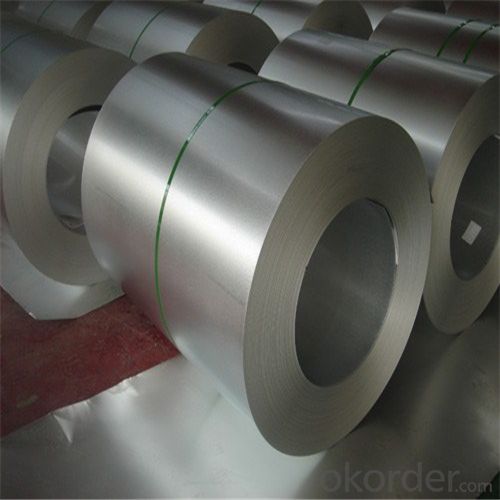
4. Hot-Dip Aluzinc Steel Coil Specification
Hot-Dip Aluzinc Steel Coil | |
Thicknenss | 0.16mm-3.5mm |
Width | 1250mm max |
Coating mass | 30-185g/㎡ |
Spangle | Regular/Minimized/Zero Spangle |
Coil inner diameter | 508-610mm |
Surface treatment | Chromated/non chromated, Oiled/non oiled, Anti finger print |
5.FAQ of Hot-Dip Aluzinc Steel Coil
We have organized several common questions for our clients,may help you sincerely:
①How about your company?
A world class manufacturer & supplier of castings forging in carbon steel and alloy steel,is one of the large-scale professional investment casting production bases in China,consisting of both casting foundry forging and machining factory. Annually more than 8000 tons Precision casting and forging parts are exported to markets in Europe,America and Japan. OEM casting and forging service available according to customer’s requirements.
②How to guarantee the quality of the products?
We have established the international advanced quality management system,every link from raw material to final product we have strict quality test;We resolutely put an end to unqualified products flowing into the market. At the same time, we will provide necessary follow-up service assurance.
③How long can we receive the product after purchase?
In the purchase of product within three working days, We will arrange the factory delivery as soon as possible. The pecific time of receiving is related to the state and position of customers.Commonly 7 to 10 working days can be served.
- Q: How is steel sustainable as a building material?How is wood sustainable as a building material?
- The choice is yours to make so just click on the proper button for the specific project and then they are right there for you to pick one. The diagrams and instructions will be right there in the computer for you to access at any time or if you prefer you can print them out.
- Q: Can steel coils be stored vertically?
- Yes, steel coils can be stored vertically.
- Q: How are steel coils made?
- Steel coils are made through a process called hot rolling, where steel slabs are heated and passed through a series of rollers to reduce their thickness and increase their length. These coils are then cooled and coiled into large rolls, ready for use in various industries such as automotive, construction, and manufacturing.
- Q: Can steel coils be coated with UV-resistant materials?
- Yes, steel coils can be coated with UV-resistant materials.
- Q: What are the different methods of laminating steel coils?
- There exist multiple techniques for laminating steel coils, each possessing its own advantages and applications. The prominent techniques encompass hot rolling, cold rolling, and continuous annealing. Hot rolling involves heating the steel above its recrystallization temperature and subsequently passing it through a sequence of rollers to generate thin sheets or coils. This method is frequently employed for the mass production of steel with a uniform thickness and surface finish. Structural applications such as construction and automotive manufacturing commonly utilize hot rolled steel coils. In contrast, cold rolling entails passing the steel coil through a set of rollers at room temperature. This process not only reduces the thickness of the steel but also enhances its surface finish and mechanical properties. Industries requiring high precision and quality, such as appliance manufacturing, electrical equipment, and automotive components, typically employ cold rolled steel coils. Continuous annealing represents an alternative approach to laminating steel coils. It involves heating the steel coil to a specific temperature and gradually cooling it in a controlled environment. This procedure aids in alleviating internal stresses and enhancing the mechanical properties of the steel, such as strength and ductility. Continuous annealing is frequently utilized to produce high-quality steel coils for applications necessitating superior surface finish and formability, like automotive body panels and household appliances. Additional less prevalent methods of laminating steel coils comprise electro-galvanizing and hot-dip galvanizing. Electro-galvanizing encompasses coating the steel with a zinc layer through an electroplating process, while hot-dip galvanizing entails immersing the steel coil in molten zinc. These techniques primarily serve corrosion protection purposes and are commonly employed in the construction industry, particularly for outdoor structures and infrastructure. To summarize, the various techniques for laminating steel coils encompass hot rolling, cold rolling, continuous annealing, electro-galvanizing, and hot-dip galvanizing. Each approach offers distinct advantages and is selected based on the specific requirements of the application.
- Q: How are steel coils used in the manufacturing of industrial conveyors?
- Steel coils are used in the manufacturing of industrial conveyors as they provide a sturdy and reliable base for the conveyor systems. The coils are typically formed into various shapes and sizes to create the conveyor frames and supports, ensuring durability and stability throughout the conveyor's operation. Additionally, steel coils can be cut and shaped to form conveyor belts, which play a crucial role in transporting materials and products efficiently within industrial settings.
- Q: How can steel coils be recycled?
- Steel coils can be recycled by first removing any non-steel materials attached to them, such as plastic or rubber. The coils are then shredded into smaller pieces and sent to a steel mill, where they are melted down and transformed into new steel products. This process helps conserve natural resources, reduces energy consumption, and minimizes waste.
- Q: what is the history of steel and how did they start making it, i need a link or an answer that is five paragraphs long. plus i need examples of subtitles about the history of steel. i am doing this for a science project and hope that someone can help me out.thanks
- There's wide history of steel, you can read different tutorials online to know more about it. Check wiki for detailed information.
- Q: How are steel coils protected from corrosion?
- Steel coils are typically protected from corrosion through a process called galvanization, where a layer of zinc is applied to the surface of the steel. This zinc coating acts as a sacrificial barrier, preventing the steel from coming into direct contact with moisture and oxygen, which are the primary causes of corrosion. Additionally, steel coils can also be protected through the application of protective coatings or by storing them in a controlled environment to minimize exposure to corrosive elements.
- Q: How are steel coils inspected for elongation?
- Steel coils are inspected for elongation using a variety of methods. One common method is the use of a tensile testing machine. In this method, a small sample is taken from the steel coil and placed into the machine. The machine then applies a pulling force to the sample until it breaks. The amount of force required to break the sample is measured, and this information is used to determine the elongation of the steel coil. Another method used to inspect steel coils for elongation is the use of ultrasonic testing. In this method, high-frequency sound waves are passed through the steel coil. By analyzing the reflection of these sound waves, it is possible to determine the elongation and other properties of the steel coil. Visual inspection is also an important aspect of inspecting steel coils for elongation. Trained technicians visually inspect the steel coils for any signs of stretching or deformation that may indicate excessive elongation. Overall, a combination of mechanical testing, ultrasonic testing, and visual inspection is used to thoroughly inspect steel coils for elongation and ensure their quality and compliance with industry standards.
Send your message to us
Hot-Dip Aluzinc Steel Coil Used for Industry with Too High Quality
- Loading Port:
- Shanghai
- Payment Terms:
- TT or LC
- Min Order Qty:
- 25 m.t.
- Supply Capability:
- 5000 m.t./month
OKorder Service Pledge
OKorder Financial Service
Similar products
Hot products
Hot Searches
Related keywords
